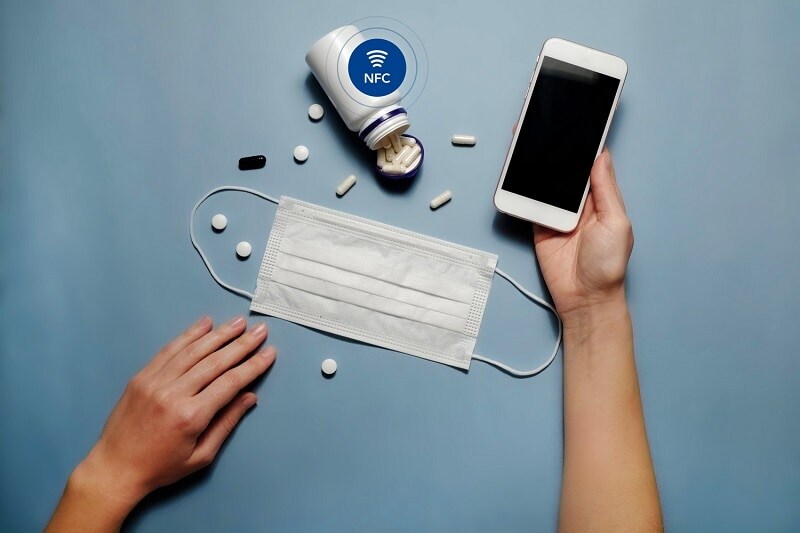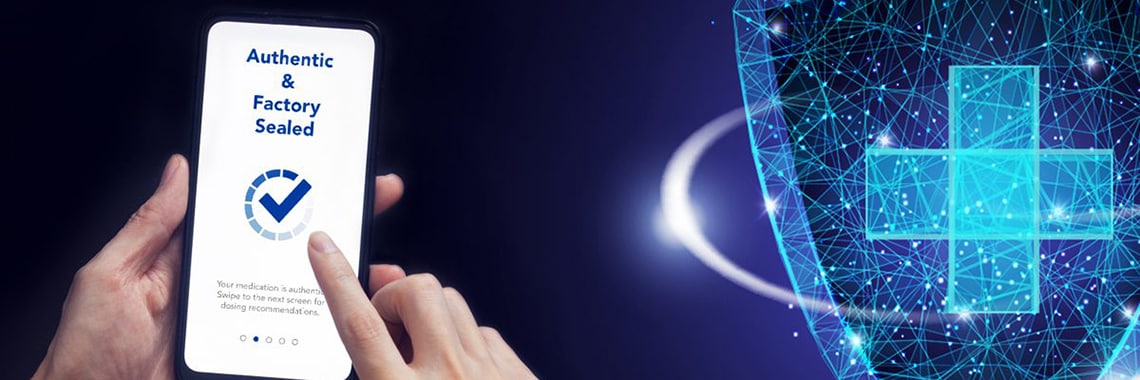Amid the tragedy of the COVID-19 pandemic there are hopeful developments.
Companies have ramped up the production of diagnostic tests and modified
existing lines to make medical devices and personal protective equipment
(PPE), while others work at speed to develop and test vaccines, treatments and
antibody test kits.
Consumers around the world are also doing their part, practicing social
distancing and self-isolating to reduce the spread of the virus and minimize
the impact on medical facilities. The desire to stay healthy has increased
demand for prevention- and immunity-oriented products, including
multi-vitamins.
Intelligent labels and packaging are helping on both fronts, supporting the
need to get healthcare supplies to end users safely and to protect patients
while offering healthcare workers secure access to accurate diagnostics and
life-saving treatments.
The technology behind these intelligent labels and packages—contactless
NFC—offers the safety and security necessary to help tackle the spread
of COVID-19 while giving scientists, medical staff and patients the ability to
interact with products so they can verify authenticity, check expiration dates
and even gain useful insights into the nature of the virus.

Digital Information and Services for Consumers
By tapping their smartphones to the product label or package, consumers can
learn about a medication and how best to use it. Interactive features can be
used to re-order supplies and renew prescriptions and can connect patients to
online health services.
-
Educate consumers. During a healthcare crisis such as this,
misinformation can spread almost as quickly as the disease itself.
Intelligent packages can link to websites or apps that separate fact from
fiction and direct consumers to relevant health agencies. Updates are easy
to manage, so the latest information is always at hand. Packaging with
opening-status detection can also enable tailored content based on the state
of the product or package label (factory sealed or open).
-
Simplify therapy compliance and self-testing. Digitized,
step-by-step instructions can guide patients and help ensure therapies are
used correctly. Quick access to online guidance, e.g. in the form of a video
link, can be especially useful as self-test kits and other diagnostic tools
designed for consumer use become available.
-
Deliver products in new ways. At-home deliveries of all
kinds of products, including over-the-counter and prescription medications,
are expected to rise. NFC tags, combined with a cloud-based data service and
an in-app capability, make it easy to send patients a refill reminder, link
them directly to doctors’ offices to renew a prescription or link
them to authorized e-commerce channels when supplies run low.
-
Step up digital engagement. Online sales for OTC
medications and other consumer-health products tend to be bought in person
(Euromonitor
says only 3% of global OTC sales happen online), but stay-at-home rules are
changing this. According to McKinsey’s view, this could lead to
higher levels of online sales for OTC and other consumer-health products,
potentially north of 15 percent, in markets such as the United States and
Europe. The current crisis is also leading more consumers to discover the
benefits of telemedicine services, using health-related digital tools and
apps. NFC-enabled labels and packages can help drive both trends by giving
consumers a direct link to online commerce platforms and valuable services.
Enhanced Safety and Integrity in the Supply Chain
Manufacturers can use NFC-enabled packages and labels to protect the supply
chain from various vulnerabilities, including counterfeit products,
grey-market diversion and product tampering. Using NFC tags, companies and
health authorities can detect and analyze problems faster and take corrective
actions sooner.
-
Give reassurance that products are authentic. The World
Health Organization (WHO) reports that 8 to 15% of drugs sold globally are
fake or substandard. Sadly, the coronavirus outbreak is seeing a new trend
in counterfeit medical items, such as counterfeit face masks, substandard
sanitizers and unauthorized anti-viral medication, as criminals take
advantage of heightened anxiety during the global crisis. By helping ensure
product authenticity and combating fraud, NFC tags with built-in security
features, such as originality signatures or AES encryption with secret keys,
can help ensure product authenticity and protect products. Anyone with a
smartphone, inspectors and consumers alike, can securely verify that a
product is genuine and meets regulatory standards. Verification can happen
in near real time, using easy yet secure online authentication checks.
-
Detect and deter tampering. NFC tags can be used for
electronic tamper evidence, which indicates if a product has been opened or
interfered with, anywhere in the supply chain prior to its sale or usage. A
conductive tamper loop in the tag of an on-pack label or inside a closure
can irreversibly store an opening detection and communicate the event to an
NFC-enabled smartphone. The tamper-evidence features help increase
confidence in the product by removing doubts about whether it has been
diluted, refilled or otherwise substituted from the original.
-
Ensure safe transport and storage. Special care needs to be
taken when storing and transporting lab substances, such as patient samples
which can be infectious. Secure packaging, with reliable tamper-evidence and
leakage protection, can enhance such protection while also being able to
store sensitive patient data that is only accessible by authorized staff.
-
Improve visibility and control in the supply chain. For
improved traceability and to help identify sales outside authorized markets,
NFC tags can be assigned to specific distributors and locations. The ability
to authenticate and trace products within the supply chain, using
geo-location and cloud based monitoring, also makes it easier for consumer
health companies to meet regulatory requirements and protect even the last
mile to the consumer. This helps address grey-market diversions, which can
involve a product being bought in a low-price region and then sold in a
high-price region at a significant mark-up or being sent to a region that
prohibits its sale for use on the black market.
-
Protect the cold chain. Many medications, including
vaccines, are heat sensitive and can lose their effectiveness when
improperly stored or transported. NFC labels equipped with temperature
sensors and data loggers can help monitor ambient temperature changes and
report to a cloud service whether a product has been handled correctly.
Manufacturers and suppliers can trace when and where any problems occur at
any point in the supply chain, and consumers can be certain of a
drug’s quality and effectiveness.

Valuable Insights for Health Agencies and Life Scientists
Consumer-health companies can help in the fight against the virus by making
use of NFC’s ability to collect data and track analytics and by
supplying insights to health organizations and life scientists. Real-time
intelligence can come from the products themselves, showing where sales and
usage are taking place, while ensuring a high level of privacy and security
for any personal data. To support testing, secure registration links can
safely give patients direct access to test results, reducing the incidence of
human error. With opt-in track and trace features, life scientists and
governments can address the ongoing risk of disease spread while enabling
faster insights and quicker corrective measures.
Our Commitment to Health and Safety
At NXP, we aim to help during challenging times. We are working with
healthcare brands and health agencies to leverage NFC during the COVID-19
crisis. We offer a full suite of fully-passive proximity tags, called
NTAG®, which work with an NFC-enabled smartphone over a close
range of just a few centimeters. Additionally, we offer fully-passive vicinity
tags, called
ICODE®, which work with a dedicated HF reader at up to 1.5 meters
and with an NFC-enabled smartphone at close range.
As the co-inventor of NFC and a long-time driver of advancements in RFID
security, we offer a compelling set of protection features, including enhanced
security (with originality signature, AES-based cryptography and SUN
tap-unique message feature), as well as conductive tamper evidence and
enhanced privacy protection. Moreover, our semi-passive temperature sensors,
NTAG Smart Sensor, combine NFC functionality with autonomous sensing and data logging, powered
by a battery, to meet cold-chain demands.
At the same time that we’re using NFC to protect products, we’re
also using NFC to protect transactions. Our contactless, NFC-driven payment
solutions are supported globally and make it possible for consumers to make
purchases without using cash by simply holding a card above a payment terminal
or using a mobile phone with a payment wallet.
Our long-standing commitment to NFC supports our mission to use technology to
create a better world and gives us a way to help keep people safe and healthy
while we battle COVID-19.






